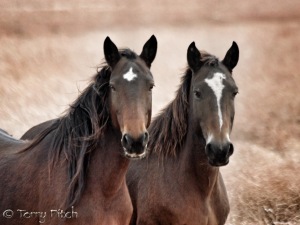Information supplied by National Equine Resource Network
NERN and R-Vets to create 100 new geldings in just 8 days
ENCINITAS, CA – National Equine Resource Network (NERN) and a group of colleagues including equine vets, vet students, and equine rescue sanctuaries gelded a total of 100 stallions and colts throughout central California. This week-long rolling series of low-cost gelding clinics potentially reduced the future horse population of the state by 500, at a time when the continuing economic downturn has significantly reduced the number of good homes available for horses.“When NERN was formed two years ago to assist the equine welfare community in saving and caring for at-risk horses, our goal was to make an immediate impact,” noted Shirley Puga, NERN Founder and Executive Director.
“Low-cost gelding clinics held in partnership with equine veterinarians were an obvious way as they require a relatively small financial commitment while producing major results by impacting the number of horses that might be neglected or abandoned in the future,” she said.
Since the average privately owned stallion will sire five foals in its breeding career, every stallion and colt gelded at these clinics reduces the future equine population by that number. According to Puga, this series was part of NERN’s continuing pilot program to provide a model for these clinics throughout the country.
The traveling gelding clinic series was a partnership between Shirley Puga, Director of NERN, Dr. Eric Davis, DVM, Founder of Rural Veterinary Experience Teaching and Service (R-VETS), and his partner Cindy McClinn, RVT, who work together to bring quality care to animals that might not always get professional veterinary treatment.
In addition to gelding 100 stallions and colts through this recent series, Puga and Davis plan to partner on future clinics throughout California. NERN also continues to refine the low-cost gelding program for distribution to rescue sanctuary operators and other equine welfare advocates throughout the country.
“The need to reduce the country’s equine population, a key component in ending equine slaughter, has never been greater and NERN will take a leadership role in this aspect of that solution”, Ms Puga stated.
She is also working with other segments of the country’s horse welfare community to convince the commercial equine industry to practice more selective breeding and provide for aftercare for their horses to eventually eliminate equine slaughter.
The eight-day traveling series held eight gelding clinics in eight cities; covering more than 1,000 miles in the heavily horse populated central part of California. The clinic locations were Salinas, King City, Lodi, Auburn, Petaluma, Woodland, Orland and Cottonwood.
Participating equine rescues were
the SPCA of Monterey County, Valley View Ranch Equine Rescue, Oakdale
Equine Rescue, The Shiloh Foundation, Sonoma Action For Equine Rescue,
and Safe Haven Horse Rescue. Contributing sponsors for this series of
clinics were One Horse At A Time and Redwings Horse Sanctuary.
Professional photographer Jim Westin volunteered his time to document
the entire event on film.
In addition to providing this much needed service to horse owners,
the clinics also served as an important training experience for a group
of UC Davis vet students who traveled with NERN and R-VETS.In April, NERN has four, one-day, gelding clinics scheduled - April 7th in Oakdale, April 15th in Ramona, April 21st in Bishop, and back in Oakdale on April 28th. Clinics are in the works for May and June as well. Interested parties can check NERN’s website at www.nationalequine.org for future clinics.
Ms Puga said planning is underway for the first out-of-state clinic, to be held in Western Washington State in late Spring/early Summer. The states of Nevada and Texas are under consideration for the Fall.
“We are proving that the equine welfare community is willing to step up to the plate to do its part in reducing our country’s horse population and therefore eliminate the need for equine slaughter and we hope the commercial breeding and racing industries will accept their responsibility also” Ms Puga concluded.
NERN’s goal for 2012 is to geld 250 stallions and colts this year, representing a future population reduction of 1,250 horses. They are well on their way. With financial assistance, they could likely do even more.
Related articles
- Overview of the American Equine Summit (rtfitchauthor.com)
- Experts Calling for Horse Slaughter Ban Unite at 2012 American Equine Summit (rtfitchauthor.com)
- Barbi Twins: Famous for… Equine Advocacy (rtfitchauthor.com)
- EWA and Angel Acres say “In Your Face” Horse Slaughter Supporting AQHA (rtfitchauthor.com)
- Wyoming Equine Terrorist Tests Legal Limits in Latest Libelous Meltdown (rtfitchauthor.com)
